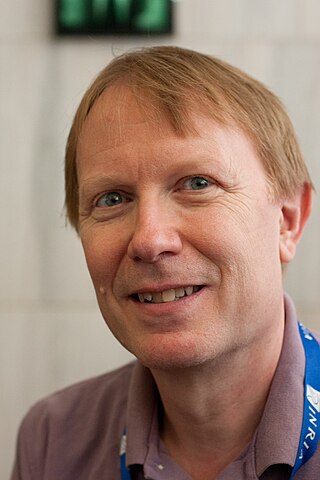Computational geometry is a branch of computer science devoted to the study of algorithms which can be stated in terms of geometry. Some purely geometrical problems arise out of the study of computational geometric algorithms, and such problems are also considered to be part of computational geometry. While modern computational geometry is a recent development, it is one of the oldest fields of computing with a history stretching back to antiquity.
Su Buqing, also spelled Su Buchin, was a Chinese mathematician, educator and poet. He was the founder of differential geometry in China, and served as president of Fudan University and honorary chairman of the Chinese Mathematical Society.
Richard Evan Schwartz is an American mathematician notable for his contributions to geometric group theory and to an area of mathematics known as billiards. Geometric group theory is a relatively new area of mathematics beginning around the late 1980s which explores finitely generated groups, and seeks connections between their algebraic properties and the geometric spaces on which these groups act. He has worked on what mathematicians refer to as billiards, which are dynamical systems based on a convex shape in a plane. He has explored geometric iterations involving polygons, and he has been credited for developing the mathematical concept known as the pentagram map. In addition, he is author of a mathematics picture book for young children. In 2018 he is a professor of mathematics at Brown University.

Jacob Theodore "Jack" Schwartz was an American mathematician, computer scientist, and professor of computer science at the New York University Courant Institute of Mathematical Sciences. He was the designer of the SETL programming language and started the NYU Ultracomputer project. He founded the New York University Department of Computer Science, chairing it from 1964 to 1980.

Irving Crane, nicknamed "the Deacon", was an American pool player from Livonia, New York, and ranks among the stellar players in the history of the sport. Widely considered one of the greatest pool players of all time, and a member of the Billiard Congress of America Hall of Fame, he is best known for his mastery in the game of straight pool at which he won numerous championships, including six World Straight Pool Championship titles.
Franco P. Preparata is a computer scientist, the An Wang Professor, Emeritus, of Computer Science at Brown University.
Victor Raskin is a distinguished professor of linguistics at Purdue University. He is the author of Semantic Mechanisms of Humor and Ontological Semantics and founding editor of Humor, the journal for the International Society for Humor Studies.

In computational geometry, the method of rotating calipers is an algorithm design technique that can be used to solve optimization problems including finding the width or diameter of a set of points.
In computing, especially computational geometry, a real RAM is a mathematical model of a computer that can compute with exact real numbers instead of the binary fixed-point or floating-point numbers used by most actual computers. The real RAM was formulated by Michael Ian Shamos in his 1978 Ph.D. dissertation.
Robert Kozma is First Tennessee University Professor of Mathematics at the University of Memphis.

Joseph S. B. Mitchell is an American computer scientist and mathematician. He is Distinguished Professor and Department Chair of Applied Mathematics and Statistics and Research Professor of Computer Science at Stony Brook University.
Ian Robertson Porteous was a Scottish mathematician at the University of Liverpool and an educator on Merseyside. He is best known for three books on geometry and modern algebra. In Liverpool he and Peter Giblin are known for their registered charity Mathematical Education on Merseyside which promotes enthusiasm for mathematics through sponsorship of an annual competition.

Károly Bezdek is a Hungarian-Canadian mathematician. He is a professor as well as a Canada Research Chair of mathematics and the director of the Centre for Computational and Discrete Geometry at the University of Calgary in Calgary, Alberta, Canada. Also he is a professor of mathematics at the University of Pannonia in Veszprém, Hungary. His main research interests are in geometry in particular, in combinatorial, computational, convex, and discrete geometry. He has authored 3 books and more than 130 research papers. He is a founding Editor-in-Chief of the e-journal Contributions to Discrete Mathematics (CDM).

Robert Leo Byrne was an American author and Billiard Congress of America Hall of Fame instructor of pool and carom billiards.
Jay Kappraff was an American professor of mathematics at the New Jersey Institute of Technology and author.
The School of Literature, Media, and Communication (LMC) is one of six units of the Ivan Allen College of Liberal Arts at the Georgia Institute of Technology. The School focuses primarily on interdisciplinary approaches to the humanities, social sciences, and science/technology to provide "Humanistic Perspectives in a Technological World."

Sergei Tabachnikov, also spelled Serge, is an American mathematician who works in geometry and dynamical systems. He is currently a Professor of Mathematics at Pennsylvania State University.
A. Michael Froomkin is the Laurie Silvers & Mitchell Rubenstein Distinguished Professor of Law at the University of Miami in Coral Gables, Florida. His work on technology law since the mid-1990s spans Internet governance and regulation, privacy, encryption, AI and medicine, drones, and robotics. In 2012, he co-founded the annual We Robot conference with Ian Kerr and Ryan Calo in order to think ahead about the challenges to law and policy that widespread use of robots will bring. He blogs at Discourse.net






